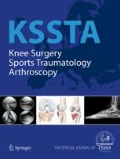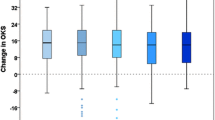Abstract
Purpose
We hypothesise that patients with a worse post-operative generic physical health, and those with a subclinical improvement, will have a greater rate of dissatisfaction with their total knee arthroplasty (TKA) despite improvement in their knee function.
Methods
Prospectively complied data for 2,330 primary TKA were used. Patient demographics, comorbidity, and pre- and post-operative (1 year) Oxford knee scores (OKS) and Short Form (SF-) 12 scores were collected. Patient satisfaction was also assessed 1 year post-operatively. The satisfaction rate of patients with a poor post-operative SF-12 physical component summary (PCS score) (≤40 points) and those with a subclinical improvement (<4 points) in the score were compared to those with a score of more than 40 and a clinically significant improvement, respectively.
Results
More than half of the patients (n = 1,220) had a poor post-operative SF-12 PCS, and a third (n = 722) had a subclinical improvement in their general physical health after TKA. These patients were more likely to be older in age, suffer with concomitant back pain, and pain in other joints, and have a significantly worse pre-operative mental well-being score (SF-12) and OKS (all p < 0.04 on regression analysis). Both groups had a clinically significant improvement in their OKS post-operatively (p < 0.001), but it was 10 and 8 points less, respectively, than those patients with a SF-12 PCS of more than 40, and a clinical significant improvement in their PCS score (p < 0.001). Logistic regression analysis demonstrated that patients who had a poor post-operative SF-12 PCS (odds ratio 7.9, p < 0.001) and those with a subclinical improvement in their general physical health (odds ratio 5.1, p < 0.001) after TKA were significantly less likely to be satisfied.
Conclusion
Despite benefitting from a significant improvement in their OKS after TKA, patients with a poor post-operative SF-12 PCS and those with a subclinical improvement in their general physical well-being are significantly less likely to be satisfied at 1 year.
Level of evidence
Retrospective comparative study, Level III.





Similar content being viewed by others
References
General Register Office for Scotland. http://www.gro-scotland.gov.uk/files2/stats/gros-mid-2008-population-estimates-scotland-population-estimates-by-sex-age-and-administrative-area/j1075008.htm
Ayyar V, Burnett R, Coutts FJ, van der Linden ML, Mercer TH (2012) The influence of obesity on patient reported outcomes following total knee replacement. Arthritis 2012:185208
Baker PN, van der Meulen JH, Lewsey J, Gregg PJ (2007) The role of pain and function in determining patient satisfaction after total knee replacement. Data from the National Joint Registry for England and Wales. J Bone Joint Surg Br 89:893–900
Becker R, Doring C, Denecke A, Brosz M (2011) Expectation, satisfaction and clinical outcome of patients after total knee arthroplasty. Knee Surg Sports Traumatol Arthrosc 19:1433–1441
Bourne RB, Chesworth BM, Davis AM, Mahomed NN, Charron KD (2010) Patient satisfaction after total knee arthroplasty: who is satisfied and who is not? Clin Orthop Relat Res 468:57–63
Clement ND, MacDonald D, Howie CR, Biant LC (2011) The outcome of primary total hip and knee arthroplasty in patients aged 80 years or more. J Bone Joint Surg Br 93:1265–1270
Culliford DJ, Maskell J, Beard DJ, Murray DW, Price AJ, Arden NK (2010) Temporal trends in hip and knee replacement in the United Kingdom: 1991 to 2006. J Bone Joint Surg Br 92:130–135
Cushnaghan J, Bennett J, Reading I, Croft P, Byng P, Cox K, Dieppe P, Coggon D, Cooper C (2009) Long-term outcome following total knee arthroplasty: a controlled longitudinal study. Ann Rheum Dis 68:642–647
Dawson J, Fitzpatrick R, Murray D, Carr A (1998) Questionnaire on the perceptions of patients about total knee replacement. J Bone Joint Surg Br 80:63–69
Escobar A, Quintana JM, Bilbao A, Azkarate J, Guenaga JI, Arenaza JC, Gutierrez LF (2007) Effect of patient characteristics on reported outcomes after total knee replacement. Rheumatology (Oxford) 46:112–119
Franklin PD, Li W, Ayers DC (2008) The Chitranjan Ranawat Award: functional outcome after total knee replacement varies with patient attributes. Clin Orthop Relat Res 466:2597–2604
Judge A, Arden NK, Kiran A, Price A, Javaid MK, Beard D, Murray D, Field RE (2012) Interpretation of patient-reported outcomes for hip and knee replacement surgery: identification of thresholds associated with satisfaction with surgery. J Bone Joint Surg Br 94:412–418
Kennedy DM, Hanna SE, Stratford PW, Wessel J, Gollish JD (2006) Preoperative function and gender predict pattern of functional recovery after hip and knee arthroplasty. J Arthroplasty 21:559–566
Kim TK, Chang CB, Kang YG, Kim SJ, Seong SC (2009) Causes and predictors of patient’s dissatisfaction after uncomplicated total knee arthroplasty. J Arthroplasty 24:263–271
Larsen K, Hansen TB, Soballe K, Kehlet H (2012) Patient-reported outcome after fast-track knee arthroplasty. Knee Surg Sports Traumatol Arthrosc 20:1128–1135
Lingard EA, Sledge CB, Learmonth ID (2006) Patient expectations regarding total knee arthroplasty: differences among the United States, United Kingdom, and Australia. J Bone Joint Surg Am 88:1201–1207
Mancuso CA, Graziano S, Briskie LM, Peterson MG, Pellicci PM, Salvati E, Sculco TP (2008) Randomized trials to modify patients’ preoperative expectations of hip and knee arthroplasties. Clin Orthop Relat Res 466:424–431
Mannion AF, Kampfen S, Munzinger U, Kramers-de Quervain I (2009) The role of patient expectations in predicting outcome after total knee arthroplasty. Arthritis Res Ther 11:R139
Muniesa JM, Marco E, Tejero M, Boza R, Duarte E, Escalada F, Caceres E (2010) Analysis of the expectations of elderly patients before undergoing total knee replacement. Arch Gerontol Geriatr 51:e83–e87
Noble PC, Conditt MA, Cook KF, Mathis KB (2006) The John Insall Award: patient expectations affect satisfaction with total knee arthroplasty. Clin Orthop Relat Res 452:35–43
Norman GR, Sloan JA, Wywich KW (2003) Interpretatation of the changes in health-related quality of life: the remarkable universality of half a standard deviation. Med Care 41:582–592
Novicoff WM, Rion D, Mihalko WM, Saleh KJ (2009) Does concomitant low back pain affect revision total knee arthroplasty outcomes? Clin Orthop Relat Res 467:2623–2629
Pettit T, Livingston G, Manela M, Kitchen G, Katona C, Bowling A (2001) Validation and normative data of health status measures in older people: the Islington study. Int J Geriatr Psychiatry 16:1061–1070
Schmitt JS, Di Fabio RP (2004) Reliable change and minimum difference (MID) proportions facilitated group responsiveness comparisons using individual threshold criteria. J Clin Epidemiol 57:1008–1019
Scott CE, Bugler KE, Clement ND, MacDonald D, Howie CR, Biant LC (2012) Patient expectations of arthroplasty of the hip and knee. J Bone Joint Surg Br 94:974–981
Scott CE, Howie CR, MacDonald D, Biant LC (2010) Predicting dissatisfaction following total knee replacement: a prospective study of 1217 patients. J Bone Joint Surg Br 92:1253–1258
Vissers MM, de Groot IB, Reijman M, Bussmann JB, Stam HJ, Verhaar JA (2010) Functional capacity and actual daily activity do not contribute to patient satisfaction after total knee arthroplasty. BMC Musculoskelet Disord 11:121
Ware J, Kosinski M, Keller SD (1996) A 12-Item Short-Form Health Survey: construction of scales and preliminary tests of reliability and validity. Med Care 34:220–233
Wolfe F, Hawley DJ, Peloso PM, Wilson K, Anderson J (1996) Back pain in osteoarthritis of the knee. Arthritis Care Res 9:376–383
Acknowledgments
We would like to thank Deborah MacDonald (Research manager) for her endless help in gathering the data presented in this manuscript. In addition we also thank all the consult orthopaedic surgeons at our study centre who have allowed their patients to be included within this study.
Author information
Authors and Affiliations
Corresponding author
Rights and permissions
About this article
Cite this article
Clement, N.D., Burnett, R. Patient satisfaction after total knee arthroplasty is affected by their general physical well-being. Knee Surg Sports Traumatol Arthrosc 21, 2638–2646 (2013). https://doi.org/10.1007/s00167-013-2523-y
Received:
Accepted:
Published:
Issue Date:
DOI: https://doi.org/10.1007/s00167-013-2523-y




